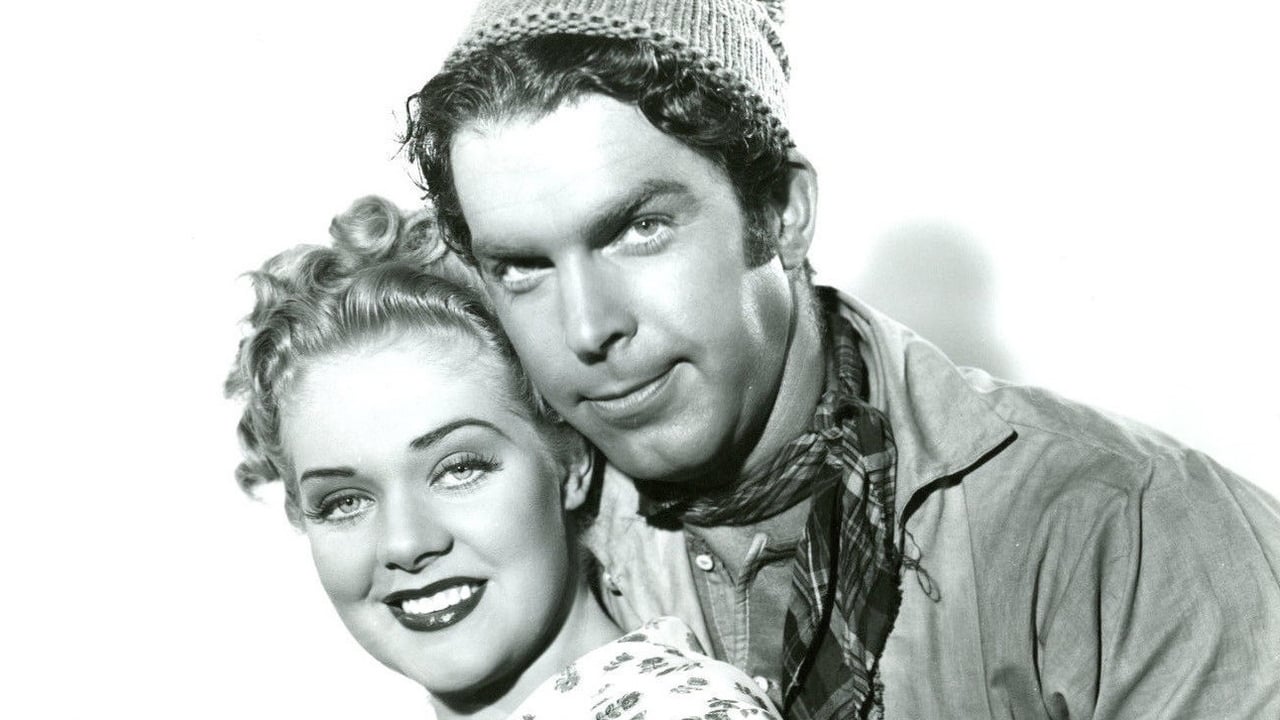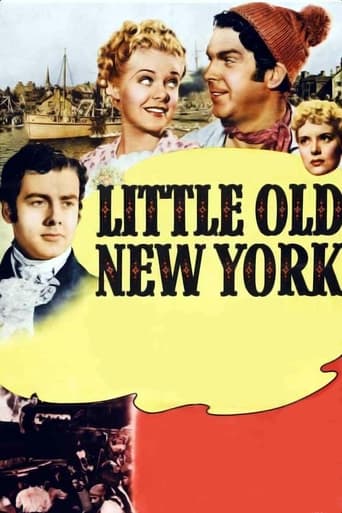

Though it probably has zip to do with the actual story of Robert Fulton and the invention and manufacture of the first steam engine this is a very pleasant little drama with light overtones. That's mainly due to the cast, all very competent performers who have a nice chemistry together.Alice Faye, not singing this time, is full of brassy snap as the most virtuous waterfront innkeeper who never existed who longs to leave the docks behind and become a lady. She's matched by Fred MacMurray full of cheery bonhomie as a shipbuilder, the now amusingly named Charley Brownne, who has a yen for Alice. Richard Greene is a bit of a stick as Fulton but he and Brenda Joyce make an attractive pair. And Andy Devine is along to add his squeaky voiced charm as a buddy of the lead pair.The title, an obvious attempt by Fox to conjure up thoughts of Alice's big hit of a few years before, In Old Chicago, has very little to do with the picture. You hardly see any outdoor shots of the city but the interior sets are handsomely mounted if unimaginatively lit as you'd expect for a Fox feature for their top star. If you're looking for a history lesson about the progress of navigation during the country's early years you won't find it here but if a enjoyable diversion for about an hour and a half is what you seek this will fill the bill. Nothing spectacular but a nice hidden gem for fans of the stars.
... View MoreThis film sports winning performances (Alice Faye is delightful and very accomplished as a light comic actress), plenty of well-played comedy and well-staged action, a fine Alfred Newman score. But what really impressed and intrigued me were some elaborately staged outdoor scenes which appeared to be at least partially shot on a real 18th century seaport, not just the back lot. Either Fox spent a whole lot of money constructing a very large and realistic looking seaport set, or some of this was shot on location at some historic recreation site, or the art director was a genius in making the back lot look a lot bigger than it was. Interesting to see what a muscular hunk Fred MacMurray was, very different than his image in later years.
... View MoreOne of the 19th centuries great inventions was the steam ship. It opened rivers that weren't able to let ships from going upstream because of their currents. Up to that point navigation only was a one way affair. The vision of Robert Fulton was instrumental in how trade and commerce could be taken to remote ports along those waterways. The story centers around the time when Fulton was at a crossroads of how to make his idea work. To make matters worse, President Jackson's embargo was working against him since he could not get the engine he needed to make his dream come true.This is a delightful view at that time in history thanks to Rida Johnson's play, as directed with his usual fine style by Henry King. The screen adaptation was by Harry Tugend, who turned the basic premise into a vehicle for Alice Faye, its star.Miss Faye was at the height of her beauty at the time. She was a natural performer who projected charm and wit in most of her screen appearances. As Pat O'Day, the girl from the wrong side of town, she was a great asset in our enjoyment of the film. The handsome Fred McMurray is seen as Charles Browne, Fulton's friend and ally. Richard Greene excels as Robert Fulton, a man of great vision that revolutionized the shipping in the United States with his steam ship invention. Brenda Joyce also has some good moments as Harriet Livingstone, the woman who conquered Fulton's heart.The supporting cast is worth mentioning. Henry Stephenson, one of the best character actors of that time plays the Chancellor Robert Livingstone. Andy Devine and Ward Bond, both veterans of the movies of that era, are prominently featured.The music of Alfred Newman and the cinematography by Leon Shamroy add another layer to this film. Ultimately it's Henry King one must thank for the delightful product he gave us.
... View MoreI only saw this film in the 1960s, and memories of it are somewhat sparse. I recall Richard Greene trying to get financing for his steamboat, and finding roadblocks by various troublemakers, mostly local sailors who realize that steam power will hurt their sail oriented business. One moment that was well handled is the burning of the original "Claremont" (the actual name of the boat was "the North River Steamboat of Claremont" - Claremont was the name of the country estate of Chancellor Robert Livingston, Fulton's backer and brother-in-law). Another moment of the film was Greene's confusing meeting with Victor Killian, introduced to him as "Mr. DeWitt" (Greene thinks it's DeWitt Clinton - Killian is actually a thug trying to create a scene in which Greene can be beaten up). Alice Faye is given a song or two to sing, and is the love interest of MacMurray (who is also momentarily jealous of Greene, but still supports the steamboat at the end).If one is really interested in the story of this invention - our first really important invention in the industrial revolution - read James Flexner's "Steamboats Come True". The actual first inventor was John Fitch, who made a successful steamboat that ran to and from Philadelphia in 1790 - 1792). Fitch was clever, but he did not know how to make a plan of the invention that could enable him to rebuild a second working steamboat. It was a hit or miss thing with Fitch. In 1798 he committed suicide in Kentucky. Besides Fitch there were other inventors (Oliver Evans, James Rumsey), but Fulton had engineering training, and was able to make patents that could be followed to repeat his invention again and again. So 1807 is the year we usually credit for the invention of the steamboat.Yet oddly enough this is the only sound film of Fulton's invention that was made in Hollywood. I suspect it is because the Claremont was a prototype that lacked the glamor of later vessels (those that plied the Mississippi River from 1828 - 1900), and that (with a few tourist exceptions) no longer matters to us. More films dealing with railway and car transportation have been made - even more about aviation and submarines. So I suspect there will never be a more solid look at Fulton's career as artist, submarine pioneer, and steamboat developer. There is another film where Fulton pops up: "Austerlitz", a French film made in the 1950s where Orson Welles appeared as Fulton trying (in 1804-05) to interest Napoleon I in his submarine. That's about it. Maybe one day a serious film on Fulton will be made. Until then we have "Little Old New York".
... View More